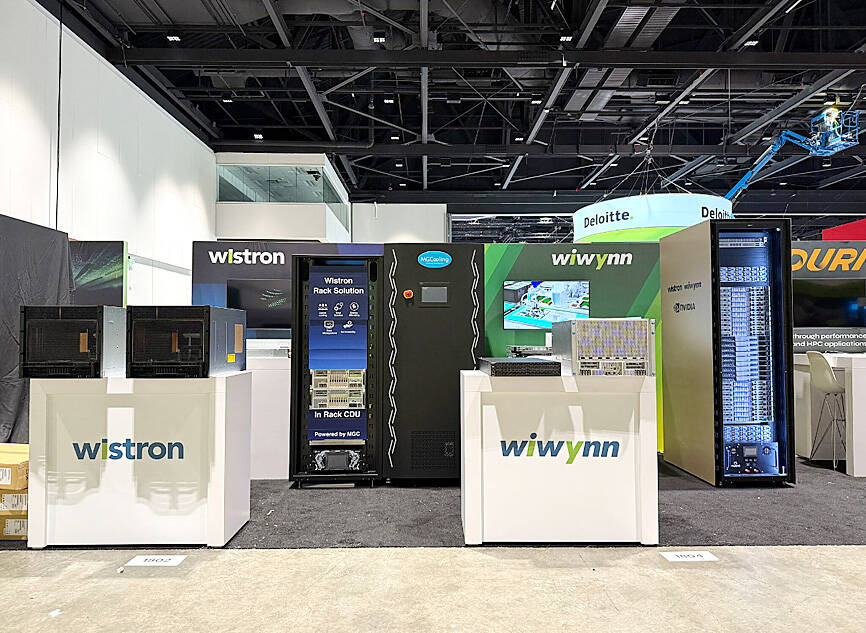Taiwan’s computer, server makers and suppliers of related components are to bear the brunt of the newly announced 32 percent tariff to be imposed by the US, as those hardware accounted for 58 percent of exports to the US in February, Ministry of Economic Affairs data showed.
The reciprocal levy of 32 percent is significantly higher than the 10 to 20 percent estimated by most research agencies. For now, Taiwanese semiconductor companies are exempted from the levy after Taiwan Semiconductor Manufacturing Co (台積電) unveiled an additional US$100 billion investment in the US last month.
Semiconductors were the third-biggest export item to the US in February, accounting for 4.6 percent at US$546 million, statistics compiled by the International Trade Administration showed.

Photo courtesy of Wiwynn Corp
The heavy tariff is to take a toll on local manufacturers of computers and servers, and other related companies, including graphic cards and solid-disk drives, as they were the biggest exporters to the US at US$6.84 billion, which were the biggest category of the total US$11.77 billion shipped to the US in February, the data showed.
Last year, local manufacturers shipped US$51.49 billion of such products to the US, more than doubling from a year earlier. Those goods accounted for 46.2 percent of Taiwan’s overall exports of US$111.36 billion to the US, statistics from the administration and the Ministry of Finance showed.
The US is the nation’s second-largest export destination, making up 23.4 percent of exports last year, the highest in 24 years.
The Ministry of Finance in a separate statement attributed the spike in US exports to strong server demand from cloud-service providers, which have hiked capital expenditures to cope with robust demand for artificial intelligence (AI) applications.
To avert adverse effects of the tariff, Wistron Corp (緯創) said on the eve of the tariff announcement that its board had approved a plan to set up a new US subsidiary, Wistron InfoComm (USA) Corp (WIUS), with initial capital of US$45 million.
WIUS plans to invest US$50 million in acquiring land and manufacturing facilities in the US, Wistron said in a statement on Wednesday.
The investment came after Wistron’s server manufacturing arm, Wiwynn Corp (緯穎), unveiled plans on March 1 to build its first US production line in Texas.
Wistron counts Nvidia Corp and other US enterprises among its major customers for general-purpose and AI-enabled servers.
The firm told investors in February that it has been exploring solutions to solve the tariff issue including converting its existing bases in Texas and California into manufacturing facilities.
At the time, some customers still requested the company ship AI servers to the US from its Mexico manufacturing sites and that they would absorb the 25 percent tariff on Mexico, given lower labor costs than the US.
Computer-related components were the second-biggest export items to the US, making up 5.5 percent of Taiwan’s exports in February at US$649 million.
Smartphones and related components, switches and routers came next with total US exports of US$525 million in February. Those suppliers would be subject to the 32 percent levy.

NOT JUSTIFIED: The bank’s governor said there would only be a rate cut if inflation falls below 1.5% and economic conditions deteriorate, which have not been detected The central bank yesterday kept its key interest rates unchanged for a fifth consecutive quarter, aligning with market expectations, while slightly lowering its inflation outlook amid signs of cooling price pressures. The move came after the US Federal Reserve held rates steady overnight, despite pressure from US President Donald Trump to cut borrowing costs. Central bank board members unanimously voted to maintain the discount rate at 2 percent, the secured loan rate at 2.375 percent and the overnight lending rate at 4.25 percent. “We consider the policy decision appropriate, although it suggests tightening leaning after factoring in slackening inflation and stable GDP growth,”

DIVIDED VIEWS: Although the Fed agreed on holding rates steady, some officials see no rate cuts for this year, while 10 policymakers foresee two or more cuts There are a lot of unknowns about the outlook for the economy and interest rates, but US Federal Reserve Chair Jerome Powell signaled at least one thing seems certain: Higher prices are coming. Fed policymakers voted unanimously to hold interest rates steady at a range of 4.25 percent to 4.50 percent for a fourth straight meeting on Wednesday, as they await clarity on whether tariffs would leave a one-time or more lasting mark on inflation. Powell said it is still unclear how much of the bill would fall on the shoulders of consumers, but he expects to learn more about tariffs

Greek tourism student Katerina quit within a month of starting work at a five-star hotel in Halkidiki, one of the country’s top destinations, because she said conditions were so dire. Beyond the bad pay, the 22-year-old said that her working and living conditions were “miserable and unacceptable.” Millions holiday in Greece every year, but its vital tourism industry is finding it harder and harder to recruit Greeks to look after them. “I was asked to work in any department of the hotel where there was a need, from service to cleaning,” said Katerina, a tourism and marketing student, who would

i Gasoline and diesel prices at fuel stations are this week to rise NT$0.1 per liter, as tensions in the Middle East pushed crude oil prices higher last week, CPC Corp, Taiwan (台灣中油) and Formosa Petrochemical Corp (台塑石化) said yesterday. International crude oil prices last week rose for the third consecutive week due to an escalating conflict between Israel and Iran, as the market is concerned that the situation in the Middle East might affect crude oil supply, CPC and Formosa said in separate statements. Front-month Brent crude oil futures — the international oil benchmark — rose 3.75 percent to settle at US$77.01